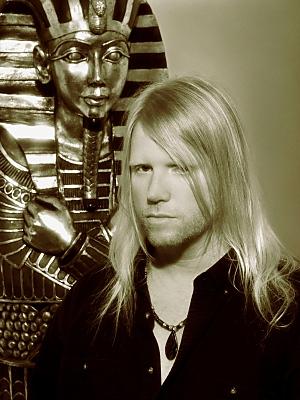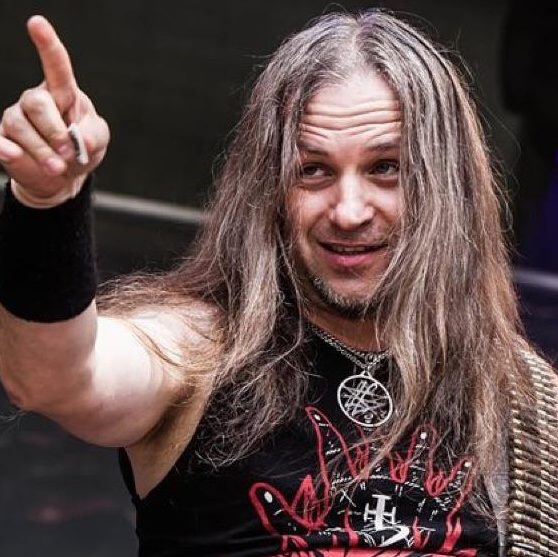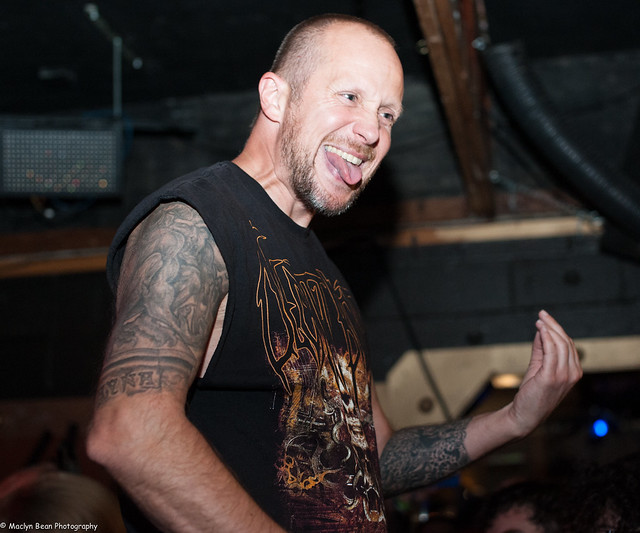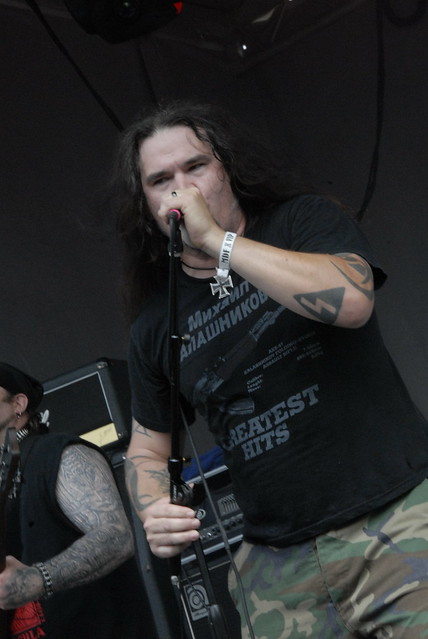It's been months since I've written a top 10 list, and that just won't do. So here's a list that feels so fundamentally appropriate for this blog that I can barely believe I haven't done it already. First, I'll give you the actual list itself. Then, I'd like to share a few thoughts and/or realizations I had as I wrote this. And so here are (just in my opinion, obviously) the top 10 death metal vocalists of all time:
--------------------
 #10. Peter Tägtgren (Hypocrisy)
#10. Peter Tägtgren (Hypocrisy)
Peter Tägtgren is probably the best overall musician on this list. A guitarist as well as a prolific songwriter and producer, he's played a big role in creating a lot of of Swedish metal. He's most prominent as the core member of Hypocrisy, where he's done some really great work, but what really convinced me of his vocal prowess was his absolutely ferocious delivery on the Bloodbath album
Nightmares Made Flesh.
#9. John McEntee (Incantation)
After a slightly bumpy transitional period, Incantation founder and lead guitarist John McEntee eventually took over vocal duties for the band in 2004. It was a good decision, as he proved to deliver a powerful guttural roar to rival anyone in the business. He struck again this year with
Dirges of Elysium, one of the best death metal records of 2014.
#8. Karl Sanders (Nile)
Nile are a band that, while solid, have rarely lived up to the promise of their truly awesome premise. That said, Karl Sanders' demonic vocal assault has always been a strong point in the band's favor. His delivery is consistently excellent, but if I were to recommend one Nile album to check out, it would be
Black Seeds of Vengeance.
#7. Piotr Paweł "Peter" Wiwczarek (Vader)
Peter has quite possibly the most distinctive sound of any prominent death metal vocalist. His singular, unmistakeable, and highly articulate bellows have been the foundation of Vader's fantastic discography for over two decades. Stunningly for a group with such a long track record, Vader's recent output has been amongst the best in the band's history.
Welcome to the Morbid Reich, especially, stands as a modern death metal classic.
#6. John Tardy (Obituary)
Obituary have long occupied a special place for me personally, as they were my first introduction to real old-school, no-frills death metal. Recently I finally got the chance to see them live. They did not disappoint. Even after a quarter of a century, Tardy's disgusting vomiting-blood vocals still stand out as the centerpiece of Obituary's distinctive sound. The band's sophomore effort
Cause of Death, a vital classic of the genre, stands as their (and his) greatest work to date.
#5. Mikael Åkerfeldt (Opeth)
Like Tägtgren, Åkerfeldt did what were probably his best death vocals on a Bloodbath record. However, his Opeth vocal work (both growled and clean) has long been truly outstanding as well. Recently, Opeth has moved away from death vocals, and Åkerfeldt has stated that he is no longer capable of delivering the deep, monstrous, strikingly clear roars for which he has become famous. That's sad news, but it does nothing to diminish the extant collection of marvelous vocals he's already recorded.
Blackwater Park was the album that first introduced me to him, and it's a great place to start if you're looking to discover the brilliance of Opeth.
 #4. Johan Hegg (Amon Amarth)
#4. Johan Hegg (Amon Amarth)
Not only is Hegg a powerhouse vocalist, he's one of the best live frontmen in the business. The towering picture of Viking brutality is everything a death metal vocalist should be. His mead-fueled roars are amongst the clearest and most articulate in the genre, his stage-presence is colossal, and his consistency is beyond reproach. Every single Amon Amarth record is good, but for me their pinnacle thus far is 2006's fantastic
With Oden on Our Side.
#3. Frank Mullen (Suffocation)
A powerhouse live performer known for his distinctive "hand chops", Mullen is most notable as the father of brutal death vocals. His rabid, violent, gut-wrenching baritone bellows inspired a generation of imitators. Like with every other element of Suffocation's sound, the army of copycats have failed to capture the blend of power, precision, complexity, and animalistic intensity that make Mullen's vocals so great. Suffocation released three great albums in the '90s before going on hiatus. They've been back in action and doing excellent work for years, but those early classics still stand as the highlights of their career.
Effigy of the Forgotten is my personal favorite.
#2. George "Corpsegrinder" Fisher (Cannibal Corpse)
By all rights, Fisher should probably be at the top of this list. He's the absolute prototype of the ideal death metal frontman. On stage and in the studio, Corpsegrinder does everything the way it should be done. Much of Cannibal Corpse's status as the default standard of American death metal is the result of his meaty, powerful delivery and commanding stage presence. Fisher's vocals are especially notable for their sustain, as he is able to hold exceptionally long notes. Much like Vader, Cannibal Corpse's long discography has seen some of its best entries in recent years. Check out this year's
A Skeletal Domain as proof. Oh, and Corpsegrinder is such an avid Horde player in World of Warcraft that Blizzard actually named an orc questgiver after him. Lok'tar Ogar!
#1. Craig Pillard (Incantation)
Many of you may find this an odd choice for top honors. After all, most (probably all) of these other men are more famous, more influential, and more prolific than Pillard. Many of them are great live, while I've never seen him perform. Those factors could have easily pointed me in a different direction. On top of that, I've read some pretty disturbing Nazi-politics-stuff from Pillard, so as a person I think he's got some fucked-up views. However, at the end of the day, I had to ask myself one simple question: who do I think has the best sounding vocals in death metal? The answer to that one is easy. Craig Pillard's deep, guttural, unholy roars are positively monstrous. They're awesome, crushing, earth-shaking thunder from the bowels of Hell. Most recently, he has appeared with his new band Disma. However, he made his bones as the original frontman for Incantation. Their debut,
Onward to Golgotha, stands as my single favorite pure death metal album of all time.
--------------------
So now that you've seen the list, here are some remarks I'd like to make.
First off, there are some notable exclusions. Angela Gossow (sorry Arch Enemy fans) didn't make the list. I know she's the most prominent female death vocalist ever, but the novelty of being a woman in a sphere dominated by men isn't enough to elevate her to the ranks of the death metal elite. Also, and more significantly, you many notice I didn't include Chuck Schuldiner. Admittedly, leaving the patron saint of death metal off this list may seem unjustifiable. However, I'd like to point out that this list was based on these individuals as vocalists: songwriting and musicianship were not a factor. Those later qualities were what really made Schuldiner great, so by excluding them he slid off the list. There were numerous other people I could have included, too, but in the end 10 is a small enough number that I had to weed out some pretty elite names.
Second, I noticed as I wrote this that my initial selection of names was heavily biased in favor of vocalists I've seen perform live. I think that, more so than for any other member in a band, stage presence really factors into a vocalist's greatness. However, I did try to avoid letting that dominate my judgement. In the end, while I do think the order was affected by live performances, nobody was included or excluded from the top 10 based on them.
Finally, I noticed that while I love old-school Swedish death metal, I never seriously considered any of the vocalists from the "Big 3" of the style. Guitar is really at the core of that sound, even more so than for other varieties of death metal, so most of those vocalists just didn't have the same kind of impact as their American counterparts. Instead, amongst the Swedes, I found myself gravitating toward the more articulate sounds of melodeath frontmen. That may have been partially a result of personal bias, but I really do think those vocalists just have a hugely valuable impact on the sounds of their respective bands.











